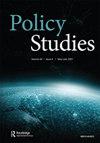高新技术中小企业的企业政策与研发支持:多视角视角
IF 2.3
4区 管理学
Q2 PUBLIC ADMINISTRATION
引用次数: 0
摘要
本文通过对韩国的一个案例研究,考察了企业政策和研发补贴计划在支持高科技中小企业中的作用。基于对35名参与者的半结构化访谈,采用定性方法分析了三个利益相关者群体、企业家、国家政策制定者和政策实践者(包括在直接支持中小企业的机构中工作的街头官僚)的观点。研究结果表明,首先,在创业的概念上存在不匹配,政策制定者和政策实践者将创业视为创业事件,而企业家则更多地关注创新。其次,虽然所有团体都认为该政策是有益的,但政策制定者和政策实践者认为有必要制定严格的实施程序,以便在许多中小企业中公平地提供补贴。相反,企业家认为政策执行的严格和复杂以及政策的不连续性阻碍了中小企业的研发绩效。第三,尽管观点不同,但都认为提高政策效能需要政策执行过程的灵活性。该研究强调了“自下而上”的政策方法在提高政策效能方面的关键作用;特别是政策实践者在政策制定和实施过程中与企业家的互动和联系。本研究有助于理解利益相关者群体在制定和实施企业政策中的角色和观点。本文章由计算机程序翻译,如有差异,请以英文原文为准。
Enterprise policies and R&D support for high-tech SMEs: a multi-perspective approach
This article examines the role of enterprise policy and R&D subsidy schemes in supporting high-tech Small- and Medium-sized Enterprises, by examining a case study of South Korea. A qualitative approach is used to analyse the perspectives of three stakeholder groups, entrepreneurs, national policymakers and policy-practitioners (including street-level bureaucrats working in bodies directly supporting the SMEs), based on semi-structured interviews with 35 participants. The findings suggest, first, that there was a mismatch in the conceptualizations of entrepreneurship, with policymakers and policy-practitioners focusing on entrepreneurship as the event of starting-up a business and entrepreneurs more on innovation. Second, while all groups feel the policy was beneficial, policymakers and policy-practitioners argue it was necessary to have a strict implementation process so-as-to deliver the subsidy fairly across many SMEs. In contrast, entrepreneurs considered such stringent and complicated policy implementation, and policy discontinuities, as impeding the R&D performance of SMEs. Third, although perspectives varied, all believed that flexibility in the policy implementation process is required to improve policy efficacy. The study highlights the critical role of “bottom-up” policy approaches to improve policy efficacy; especially policy-practitioners’ interactions and networking with entrepreneurs in the policy development and implementation processes. This study contributes to understanding the roles and perspectives of stakeholder groups in developing and implementing enterprise policies.
求助全文
通过发布文献求助,成功后即可免费获取论文全文。
去求助
来源期刊

Policy Studies
PUBLIC ADMINISTRATION-
CiteScore
5.40
自引率
4.50%
发文量
34
期刊介绍:
These changes at the structural level of the global system have impacted upon the work of public organizations either directly or indirectly and have broadened the field of action in policy studies. It has five main areas of intellectual interest: 1.To broaden the lens of policy analysis through the publication of research which locates policy-making within a theoretical, historical or comparative perspective. 2.To widen the field of enquiry in policy analysis through the publication of research that examines policy issues in a British, comparative, international or global context. 3.To promote constructive debate on theoretical, methodological and empirical issues in policy analysis.
 求助内容:
求助内容: 应助结果提醒方式:
应助结果提醒方式:


